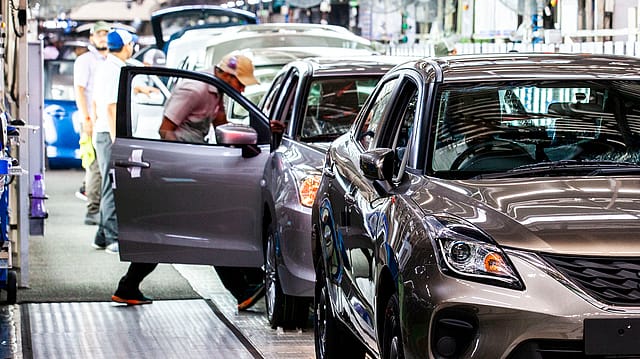Maruti Suzuki margins down 30% but silver lining in fuel-efficient models
ADVERTISEMENT

The net profit margin of Maruti Suzuki India Limited (MSIL) has fallen sharply by 30% from last year, as steep commodity prices continue to take their toll on India's largest maker of passenger vehicles, MSIL's annual report shows.
Maruti Suzuki's net profit margin was at 4.5% in the financial year 2021-22, compared to 6.4% in FY21, the report shows. The company has seen net profit margins of 9.0% in FY19 and 9.9% in FY18 respectively. Calendar year 2018 was the best year in terms of passenger vehicle sales—where 3.39 million units were dispatched from factories by various OEMs.
“The sudden and steep increase in the prices of commodities adversely affected the margins in FY 2020-21 and FY 2021-22. However, in quarter 1 of FY 2022-23, the prices of commodities have softened. Going ahead, given the extent of global uncertainties, it is difficult to predict the prices of commodities,” the company states in its report. Some of MSIL’s highest-selling models belong to its mini and compact segments. MSIL sold 253,864 mini and compact vehicles in the April-June quarter of FY 2022-23, whereas in the same period of FY 2018-19, when the sales of passenger vehicles were at its peak, MSIL sold 337,706 mini and compact vehicles, when margins were better. In the utility vehicles segment, where margins are believed to be a lot higher than mini and compact vehicles, MSIL only sold 80,852 vehicles in the April-June quarter of FY 2022-23.
“The sale of the non-premium hatchbacks declined by 5% compared to 2020-2021 and were lower than sales in this sector in 2018-19 by 29%. This sector has been affected the most affected by rising costs and the trend has continued,” says RC Bhargava, chairman, MSIL, in his message to shareholders. Bhargava also concedes that the SUV sector, on the other hand, has continued to grow. “We did not have enough models in this segment to compete effectively, though the situation has now become much better with the launch of the remodelled Brezza and the global launch of the Grand Vitara. More models are to follow. We are hopeful that MSIL’s market share will rapidly increase in the SUV segment,” Bhargava explains. In FY 2021-22, MSIL’s market share declined to 43.4%.
However, MSIL is also optimistic that its introduction of newer models in the SUV segment will help it recover lost ground from the competition. “We have started strengthening the SUV segment with the All New Brezza and we have received an overwhelming response from our customers. Similarly, Grand Vitara, another introduction in the SUV segment of the Company, has been proving to be a blockbuster from day one. The company will continue to strengthen the SUV segment in near future,” says Hisashi Takeuchi, MD and CEO, MSIL.
The company believes that increasing fuel prices will help people gravitate towards their fuel-efficient models. “While an increase in crude oil prices may affect overall demand sentiment, it will also attract customers towards more fuel-efficient cars in which the company has an advantage,” it says. It has also improved the fuel efficiency of its K-series engine. In the case of the Celerio, the fuel efficiency of its gasoline engine, with an automatic gearbox, has increased by 23.3% from the outgoing generation, and CNG has increased by 16.8%.
MSIL has also seen the contribution of green vehicles (CNG + smart hybrids) in overall sales have increased to 27% in FY 2021-22 (10% smart hybrids and 17% CNG respectively) from 20.5% in FY 2020-21. During FY 2021-22, MSIL sold around 234,000 units of CNG vehicles and is seeing a CAGR of 26% in sales of CNG vehicles in the past five years. “The trend of growth in the sales of S-CNG and SHVS (smart hybrid) vehicles demonstrate the acceptance of low-carbon technologies among customers,” the company adds. Takeuchi also adds that Grand Vitara’s strong hybrid variant offers fuel efficiency of 27.97 km/litre, the most fuel-efficient model in its category. “It outstrips the diesel offering in the segment by a wide margin,” he adds.
However, despite changing consumer dynamics and preferences, MSIL continues to believe in the potential of the small-car market. “India has a car ownership penetration of approximately 3% of its population. While replacement purchases and additional purchases by this 3% segment are welcome, sustained healthy growth can come only if more consumers from the 97% segment who currently don’t have a car make their first-time purchases,” the company adds.
The company believes that entry-level cars should be made affordable to first-time buyers and all stakeholders should make conscious efforts to make this happen. “Small cars are inherently a more sustainable solution for ecology and economy as they use less raw material, have lower emissions, consume less fuel, put a lesser strain on the road and parking infrastructure and give mobility to a wider section of society. If small car purchases grow in India, it will be good for the people of India, for the economy, for employment and for society as a whole,” the company explains.